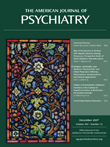Pupillary Reactivity to Emotional Information in Child and Adolescent Depression: Links to Clinical and Ecological Measures
Abstract
Objective: Pupil dilation provides a quantitative index of the temporal pattern of brain reactivity to emotional stimuli. Previous reports indicate that depressed adults show sustained pupil dilation to emotional words, but this phenomenon has not been investigated in children. This study investigated pupil dilation in children with depression and examined how differences in pupillary responses to emotional stimuli correlate with self-rated emotional experiences in participants’ natural environments in everyday life. Method: Participants were 20 children with major depressive disorder and 22 comparison children ages 8–17. Pupil dilation was measured during a valence identification task. Participants also rated positive and negative affect in their natural environments as part of an ecological momentary assessment protocol. Results: Children showed greater pupil dilation to negative words than to neutral or positive words. Children with major depression had diminished late pupil dilation relative to comparison children 9–12 sec after a negative word was presented. Diminished late pupil dilation to negative words was associated with greater severity of depression and with higher levels of negative affect and lower levels of positive affect in the natural environment. Conclusions: Depressed children exhibit a dynamic change in cognitive-affective resources devoted to processing negative emotional words, with more dramatic decreases than in comparison children after a negative word is initially processed, a pattern that differs markedly from that observed in depressed adults. Diminished late pupil dilation in children with major depression could be a marker for problems in emotional reactivity and/or regulation associated with pediatric depression.



